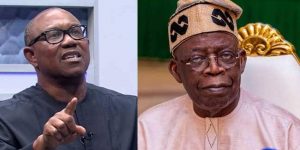Obi, a former governor of Anambra State faulted how the former Minister of Communication and Digital Economy, Prof. Isa Pantami, backed a crowdfunding effort initiated last week to secure the release of six girls kidnapped along with their father in Abuja.
The presidential candidate of the Labour Party (LP) in the 2023 general elections, Peter Obi, has lambasted President Bola Tinubu and Nigerian political leaders over the daily rising insecurity in the country.
Reacting to a report by an international newsmagazine, The Economist of London captioned “Kidnappers are wreaking havoc in Nigeria” which was published on January 18, Obi said that Nigerian politicians only care about national insecurity based on how close it gets to their mansions in Abuja.
He pointed out that despite President Tinubu declaring security as his “top priority” on May 29, 2023 during his inauguration, more than 3,600 people were kidnapped while almost 9,000 Nigerians were killed in conflict in 2023.
Replicating The Economist’s report, Obi in a series of posts on his X (formerly Twitter), said that “For those who have continued to see my issue-based constructive criticism of a bad system as bad and are maligning my person and the Obidients for seeking good governance and a better future for all Nigerians, let them now read this report from the respected international newsmagazine, The Economist of London and do the same.”
The Economist report replicated by Obi stated that “How much politicians in Nigeria care about national insecurity has long been correlated with how close it gets to their mansions in Abuja, the capital. On its outskirts on January 2nd, a father and his six daughters were kidnapped, prompting a rare outcry on high.”
Obi lamented that “In one incident last week in the Southeast, 45 people were kidnapped and are still missing, yet few leaders spoke out.
“The deadliest zone is the Northeast, where jihadists linked to Islamic State attack the army and villages.
“The North-West, too, is riddled with gangs that routinely kidnap for ransom. A decades-long conflict between mostly Muslim herders and largely Christian farmers rumbles on in the country, where on Christmas Eve, gunmen mowed down at least 160 people.
“Separatist violence still smolders in the Southeast. At his inauguration last May, Mr Tinubu declared security his “top priority”. Yet more than 3,600 people were kidnapped in 2023, the most ever, according to Acleded, a global monitor of conflict.
“The snatching rose sharply after Mr Tinubu took office. And almost 9,000 Nigerians were killed in conflict last year. The government stresses that, in its most recent budget, spending on defense and the police took the biggest share, about 12% in all.
“Defence got a fifth more than it did last year. Yet inflation is running at 29%, so in real terms the defense budget has fallen. The government tends to splurge on fancy weapons systems that fail to tackle the roots of the problem, which are poverty, poor education, and anger at army atrocities.
“The latest budget includes funds for six t-129 Turkish attack helicopters on top of the 12 costly Bell choppers bought last year from America for $1bn, not to mention 12 Super Tucano attack aircraft.”
He said that “Buying strike drones has become so popular that the army runs in a fleet alongside that of their Forcerce. But drones are very good at guarding schools from kidnappings, and heavy weaponry risks disaster. A drone recently killed at least 85 civilians at a festival in Kaduna state—not the first such cock-up.
“The army promised to “fine-tune” its operations, but more radical change is needed. The police, well equipped but able to use better human intelligence, should lead on domestic security, not the army, which has been deployed in all 36 of Nigeria’s states.”
Obi further pointed out that “Another huge problem is graft in security spending. “Defence is a prime part of the budget where you can take large quantities of money out without people being any the wiser,” says Matthew Page of Chatham House, a think-tank in London.
“Much of the budget is still about rewarding those who paid to get Mr Tinubu elected. Sometimes the army fails to receive its budget allocation. This is worsened by a system known as “security votes”, whereby parts defensece spending are deemed too sensitive to require public oversight.
“The practice, which accounts for perhaps $700m a year, increased sharply under the last president and may well jump more under Mr Tinubu. The defense budget has nearly tripled since 2019.
“But thanks to inflation, wasteful purchases, sales, and corruption, Nigerians do not suffer. General Christopher Musa, chief defence staff, appears to understand the roots of the insecurity.”
Obi further wrote, “‘Military effort alone is incapable of restoring enduring peace,’ he says, adding that the army helped build hundreds of schools under his command in the north-east. Yet many politicians seem keener to spend on themselves, rather than create the conditions for peace or fill the country’s fiscal hole.
“Even if Mr Tinubu resists the temptation to reinstate the petrol subsidy that he largely removed last year, debt servicing alone in 2024 may gobble up 61% of revenue.
“In November the national assembly approved SUVs for all 460 lawmakers, at a reported cost of $150,000-plus per car.
“In two months the government has budgeted $31m to improve accommodation for the president and vice-president—in a country of around 220m people where more than 80m are reckoned to live on less than $2.15 a day and many fear being kidnapped.”
 DailyrecordNg …Nigeria's hottest news blog
DailyrecordNg …Nigeria's hottest news blog









